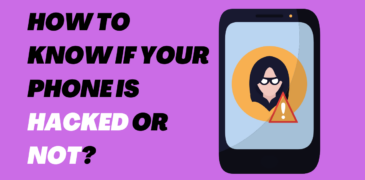In our modern, interconnected society, smartphones have become an integral part of our lives, holding a vast amount of personal information. From cherished photos to sensitive banking details, our devices are repositories of our digital selves. However, this interconnectedness also exposes us to potential security risks. Hackers are relentless in their pursuit of exploiting vulnerabilities and gaining unauthorized access to our phones. Therefore, it is essential to remain vigilant and informed about the signs that our phones may have been hacked.
In this article, we will delve into the common indicators of a hacked phone and present practical steps to safeguard our digital privacy.
Signs Your Phone May Be Hacked
Unusual Battery Drain and Performance Issues
- One telltale sign of a hacked phone is excessive battery drain and sudden performance issues. If your phone starts draining battery rapidly or becomes slow and sluggish for no apparent reason, it could be a sign of malware running in the background.
Unexpected Data Usage and Increased Bills
- Keep an eye on your data usage and monthly bills. If you notice a sudden increase in data consumption or receive unusually high bills, it could indicate that malicious software is using your data without your knowledge.
Suspicious Text Messages or Calls
- Pay attention to unexpected text messages or calls from unknown numbers. These could be phishing attempts or attempts to gather personal information. Be cautious and avoid clicking on any links or sharing sensitive details.
Unauthorized Access to Accounts
- If you find that your accounts, such as email or social media, are being accessed without your knowledge, it’s a strong indication that your phone may have been hacked. Look out for unrecognized login activity and take immediate action to secure your accounts.
Unusual Background Noises During Calls
- During phone calls, if you hear strange background noises, echoes, or interruptions, it could mean that someone has gained unauthorized access to your device. This can happen through spyware or call recording apps installed without your consent.
Unusual App Behavior
- Pay attention to any unusual behavior from your apps. If they start crashing frequently, displaying unexpected ads, or behaving erratically, it could be a sign that your phone is compromised.
Increased Network Activity and Data Transfers
- Monitor your network activity and data transfers. If you notice an unusual spike in network usage, particularly when you’re not actively using your phone, it could indicate that your device is being controlled remotely.
Overheating and Increased Mobile Data Usage
- If your phone is constantly overheating, even with minimal usage, it might be a result of malware or malicious processes running in the background. Additionally, a sudden surge in mobile data usage without any apparent reason could be a red flag.
Disabled Security Features
- Hackers often disable security features on compromised devices to make their actions undetectable. If you find that your device’s security features, such as antivirus or firewall, have been disabled or modified without your knowledge, it’s a clear sign of a potential hack.
Strange Pop-ups and Redirects
- If you frequently encounter strange pop-up ads or your browser is constantly redirecting to unfamiliar websites, your phone may be infected with adware or malware. These intrusive actions are indicators of a possible hack.
Steps to Protect Your Phone and Verify Security
Keep Software Updated
- To safeguard your phone against potential security risks, it is crucial to regularly update your device’s operating system and applications. By installing software updates, you ensure that your phone has the latest security patches, effectively addressing vulnerabilities that hackers may attempt to exploit. Stay protected and keep your data secure by prioritizing timely updates for optimal device security.
Use Strong and Unique Passwords
- Create strong and unique passwords for all your accounts. Avoid using common passwords and consider using a password manager to securely store and manage your passwords.
Enable Two-Factor Authentication
- Enable two-factor authentication (2FA) for your important accounts. This adds an extra layer of security by requiring a verification code in addition to your password.
Be Cautious of App Downloads
- Ensure the safety of your device by exclusively downloading apps from reputable sources like official app stores. Refrain from downloading apps from third-party websites, as they may harbor malware or malicious code that can compromise your device’s security. Prioritize your digital well-being by sticking to trusted sources for app downloads and protecting your device from potential threats.
Review App Permissions
- Regularly review the permissions granted to apps on your phone. Remove any unnecessary permissions that could potentially compromise your privacy.
Install a Reliable Security App
- Install a reputable mobile security app that provides real-time scanning for malware, privacy protection, and anti-phishing features. These apps can help detect and remove threats from your device.
Be Wary of Public Wi-Fi
- Take caution when connecting to unsecured public Wi-Fi networks, as they can expose you to potential hacker threats. Whenever feasible, it is advisable to steer clear of such networks altogether. However, if you find yourself needing to use public Wi-Fi, consider employing a VPN (Virtual Private Network) to encrypt your internet traffic.
Regularly Back Up Your Data
- Back up your phone’s data regularly to ensure you have a copy of your important files and information in case of a security breach or device loss.
Review and Limit App Permissions
- Periodically review the permissions granted to your installed apps and revoke unnecessary ones. This helps protect your privacy and limits the access that apps have to your personal data.
Also read:
7 Ways to Secure Android Phone from Hackers
Five Ways to Protect Yourself from the Internet
How to Protect Your Small Business’s Website From Cyberattacks
FAQs
What are the signs that my phone may have been hacked?
There are several signs that may indicate your phone has been hacked, including unusual battery drain, unexpected data usage, suspicious text messages or calls, unauthorized access to accounts, unusual background noises during calls, unusual app behavior, increased network activity and data transfers, overheating and increased mobile data usage, disabled security features, and encountering strange pop-ups and redirects.
How can I protect my phone from being hacked?
Safeguarding your phone from hacking attempts involves multiple actions. These include updating your software, employing strong passwords and two-factor authentication, being cautious with app downloads, reviewing permissions, installing a trusted security app, exercising caution on public Wi-Fi, regularly backing up your data, and managing app permissions. These combined measures fortify your phone’s defenses and reduce the risk of hacking incidents.
What should I do if I suspect my phone has been hacked?
If you suspect your phone has been hacked, it’s important to take immediate action. Start by disconnecting your phone from the internet and running a security scan using a reputable mobile security app. Change your passwords for all your accounts and enable two-factor authentication where possible. If the issue persists, consider contacting your phone’s manufacturer or your mobile service provider for further assistance.
Can I prevent my phone from being hacked?
While it’s not possible to completely eliminate the risk of your phone being hacked, you can take proactive steps to reduce the likelihood. These include practicing good security habits such as regularly updating your software, using strong and unique passwords, being cautious of app downloads, and avoiding connecting to unsecured public Wi-Fi networks.
Should I be concerned about my phone’s security if I have antivirus software installed?
While having antivirus software installed is a good security measure, it’s important to note that it’s not foolproof. Antivirus software can help detect and remove known malware, but new threats and sophisticated hacking techniques may still bypass these defenses. It’s essential to complement antivirus software with other security practices such as keeping your software updated and being cautious of app downloads.
Can a factory reset remove hacking malware from my phone?
In most cases, a factory reset can remove hacking malware from your phone. However, it’s important to note that some advanced malware may be able to survive a factory reset by infecting the system partition or hiding in other areas of the device. If you suspect your phone has been hacked, it’s recommended to consult with a professional or contact your phone’s manufacturer for guidance on the best course of action.
Conclusion
In today’s digital era, ensuring the security of your phone and safeguarding your digital privacy is paramount. By staying alert and knowledgeable about the signs of a compromised phone, you can proactively shield your personal information. Stay updated with software upgrades, employ robust passwords, activate two-factor authentication, and exercise caution while downloading apps. By adhering to these practices, you can significantly reduce the likelihood of a security breach, ensuring a safe and protected mobile experience. Always bear in mind that your phone serves as a gateway to your sensitive data, underscoring the importance of proactive measures to maintain your digital privacy.







